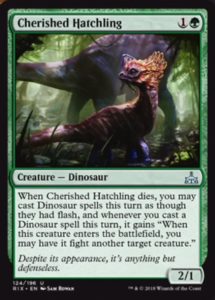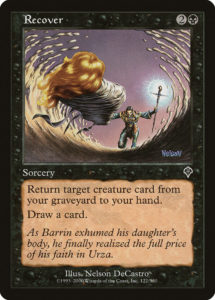A couple days after New Year’s, a coworker asked me to recommend a book. She had two criteria: no dead mothers and no children in peril. As a mother, she was sick of the first and, as a mother, she didn’t want to think about the second. Coincidentally, this was the same day that Cherished Hatchling was spoiled—a story in itself that potentially involves both.

That story Cherished Hatchling tells is an uniquely Magical one—one conveyed, not through language, but through the actual operations of the game. You may make it through the entire game with your Hatchling unscathed, its watchful parents hiding in the rushes as it swings for the final two points of damage. You may also callously throw it in front of a marauding Wakening Sun’s Avatar. There’s a complete story hiding within the card: it dies, its enraged parents come screeching in and take out its killer, even at the cost of their own lives. But, as in real life, there’s no guarantee that that’s how the story goes. I write flash fiction in my off hours, and I’m ashamed at what a beautiful story this card tells with such economy.
The death of children is inherently tragic in the modern mindset—which is odd, as children dying is one of the constants of human civilization. Per the CDC, in 1915, there were 99.9 childhood deaths per 1,000 births in America; in 1925, it stood at 77.1 per 1,000 births. In 2013, there were six. That’s modern history, too, with plumbing technology and an awareness of medicine. As our mortality rate has fallen—with qualifications, as our national life expectancy has decreased for the second year in a row—our culture has changed (thinking here of Wordsworth’s “We Are Seven” and children’s primers like “The Happy Deaths of Ten Boys”). Children dying in this day and age is tragic, where it used to be all but inevitable. Our culture reflects that—a culture in which the lives of children are cherished.
We get that word, “cherish,” from the French “chierir,” meaning “to hold dear.” An object can be cherished, as can a person. There’s something so anodyne about “to hold dear,” something inherently reductive about “cherishing” something. The things we cherish, we love because of the threads that tie the thing or person to the experiences that involved them. That’s why “cherished” is such a resonant word in the name of the doomed dinosaur—it implies a simplicity, love as a constant and accepted state of being. The crux of the word is that we cherish things that have potential, not utility. There’s a connotation of nurturing tied up in the word—and we only nurture things that are helpless. “Cherished Hatchling” is the only thing this card could be named.

Contrast this to a similar narrative—the Invasion printing of Recover. There’s no specificity to the card concept—nothing that determines that it must be Barrin, reclaiming his daughter’s corpse—as suggested by the frequency with which it’s been reprinted with different art. The flavor is the same, but the narrative is different each time. It’s gone from an act of sorrow to an act of exploitation; imagine if Cherished Hatchling was the same card, only called “Easy Prey.” The bones of the story would be the same—dinosaurs racing to the side of a dead thing—but the story would be completely different with such a minor change. Magic deserves praise for sketching such a minor, but resonant, tragedy through game mechanics; I can’t think of a card game that does something so blatantly but effectively.
In general, I’m struck by how many stories Rivals is able to tell. Contrast something like Storm Fleet Sprinter (it is a pirate who runs fast) to something like Wayward Swordtooth. The Swordtooth is useless unless its surrounded by potential prey or wild expanses; it helps you discover new territory with its ceaseless hunt. Once its surrounded by prey and a huge habitat, it starts listening to you, and can be controlled. As a side note, I love that cards from twenty years ago still have their DNA sunk in the current game—Exploration yields Explore yields a whole host of cards that go peripatetic and help us make land drops with the flavor of exploration. That assumed trope can then be expanded upon with later iterations. For example, Awakened Amalgam is the reward you get for exploring your whole world—for ranging through varied terrain and calling upon different types of mana, representing a complete world. It may only be a vanilla beef-robot, but it’s something you’re granted after an epic journey—and it gets better the closer you are to having the City’s Blessing, to boot. These stories surround those of us who play this game, whether we pick up on the details or not, and these are stories only Magic is capable of telling through the operations of the game.
When my coworker asked me for recommendations last week, I froze. My purview is postmodern fiction, which is trash when it comes to dealing with maternal death and loves to damage children. Parental grief destroys me, personally: Three Billboards Outside Ebbing, Missouri was harrowing—hell, as was The Fault in Our Stars—so I knew there must be books I’d read that didn’t involve those two issues, but I couldn’t think of one on the spot. Upon reflection, I went with something anodyne and work-related: The Righteous Mind by Jonathan Haidt. If I’d been bolder, I’ve have handed her a compilation of short stories with Cherished Hatchling as a book mark—and I still may, as a supplement.
A lifelong resident of the Carolinas and a graduate of the University of North Carolina, Rob has played Magic since he picked a Darkling Stalker up off the soccer field at summer camp. He works for nonprofits as an educational strategies developer and, in his off-hours, enjoys writing fiction, playing games, and exploring new beers.

